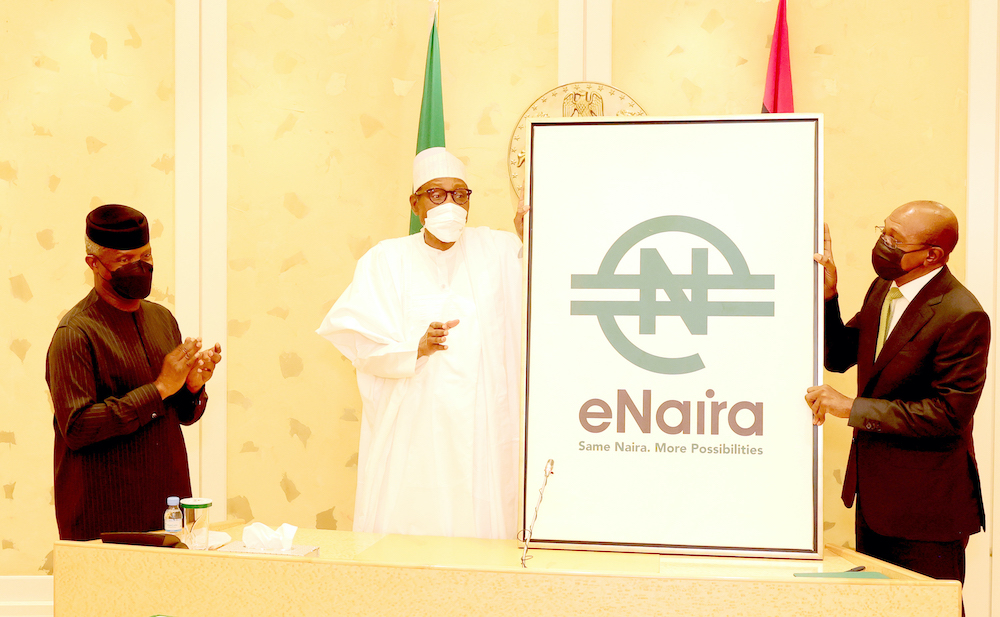By Abdulrahman Abdulraheem
Weeks after the Central Bank of Nigeria (CBN) put a limit on daily and weekly cash withdrawals for individuals and companies, people are considering adopting the eNaira in order to cope with the reality of the policy. A survey by Economic Confidential shows that more Nigerians have either joined the train or expressed readiness to do so since the CBN is not yielding to pressure to back down on the policy.
On October 25 2021, President Muhammadu Buhari and CBN Governor Emefiele unveiled the digital currency in Abuja, with already minted 500 million eNaira ($1.21million). The currency developed by fintech company Bitt, is the digital form of the physical Naira and issued in line with Section 19 of the CBN Act. At the launch, many were not keen about the innovation due to doubt about its workability.
The eNaira has remarkable benefits. Built on a blockchain open ledger technology that prevents creation of fake units, each note is unique. The legal tender is unlike Bitcoin and other cryptocurrencies that have no backing from the authorities. The eNaira will not fluctuate at different rates like the traditional Naira; it eases transactions and offers digital stability, reducing the need for cash.
Furthermore, unlike conventional digital banking which involves customers transacting with bank money, it is actual money earned and maintained by customers in their e-wallets. The eNaira has since 2021 complemented the traditional Naira as a less costly, more efficient, safe and trusted means of payment.
The vision of the Emefiele-led CBN include financial inclusion, reduction of budget leakages, direct welfare disbursements, seamless diaspora remittances, and reduction of cost of processing cash, availability of Central Bank money, increased revenue and tax collection, strong payment systems, and trimming cost of printing cash worth N307billion between 2014 and 2019.
Checks with a cross-section of traders, artisans, students, among others found there is a new wave of enthusiasm and desire to register on the eNaira platform to aid business deals in the wake of cash withdrawal limitations.
Mr. Emefiele pushed for Nigeria to become the first African country to embrace the eNaira and in accomplishing this feat, he and his team repeatedly explained that the currency would serve the same purpose as the physical cash but in a more efficient and safer way.
CBN’s Director of Information and Technology and Coordinator of eNaira project, Rakiya Mohammed Shuaib noted that the medium of exchange will drive the government’s cashless scheme as it allows users to do transactions peer to peer just like with crypto and cash.
“eNaira is a legal tender backed by law. It is exchanged one to one Naira, so everything you can do with cash, you can do the same. With the introduction of the USSD, you can dial *997# and conduct your transaction. We’re bringing in the people who hitherto could only use cash when physically present to an online version, a digital economy space,” Rakiya noted.
On December 6, 2022, the CBN listed eNaira as one of the available options after ordering financial institutions to restrict daily withdrawals to N50,000 for individuals, N500,000 weekly, and N5,000,000 weekly for corporate organizations.
“Customers should be encouraged to use alternative channels (internet banking, mobile banking apps, USSD, cards/POS, eNaira, etc.) to conduct their banking transactions,” Director of Banking Supervision, Haruna Mustafa wrote in a December 21 circular.
The CBN’s roll out of new N200, N500 and N1,000 notes, the only acceptable ones from February 1, was part of efforts to clean up the economy and save the Naira from its free fall in recent years. However, the Nigeria Financial Intelligence Unit (NFIU) has announced a ban on cash withdrawals from government/public accounts at federal, state and local levels. This takes effect March 1.
The combination of these policies is expected to further encourage Nigerians to key into the eNaira which has recorded over 700,000 transactions worth N8billion within a one year. Official figures show 840,000 downloads and 270,000 active wallets, comprising over 252,000 consumers plus 17,000 merchants.
Additionally, there are nearly 1 million customers on board; N3billion minted by the CBN; N2.1billion issued to financial institutions; 33 banks integrated and more than 3,300 merchants registered. There are over 2.5 million daily visits to the eNaira website.
A UK-based Nigerian economist, Elvis Otsemehuno Ogah said the introduction was a masterstroke in government’s decision to control cash flows, reduce the cost of printing currency, transit to full cashless economy and stabilise the monetary system. He observed the acceptance and usage since the announcement of new monetary policies.
“This singular act has driven the public to seek alternative means of making legitimate transactions, and unsurprisingly, the eNaira which upon its official launch was greeted with scepticism is now the attractive and reliable payment instrument people are turning to,” Ogah said.
Abdulrahman Abdulraheem, a public analyst, writes from Abuja.

 Join Daily Trust WhatsApp Community For Quick Access To News and Happenings Around You.
Join Daily Trust WhatsApp Community For Quick Access To News and Happenings Around You.


